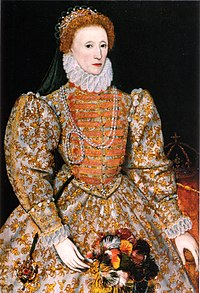Elizabeth I of England
Appearance

Elizabeth I (1533–1603) was Queen of England from 1558 until her death in 1603. Her rule saw Protestantism restored in England. She was famously known as The Virgin Queen, as she never took a husband. After her death, James I and the House of Stuart came to the throne.
Sourced quotes
- "The queen of Scots is this day leichter of a fair son, and I am but a barren stock."[1]
- Simple: The queen of Scots today gave birth to a fair son, but I have no children.
- "I know what it is to be a subject, what to be a Sovereign, what to have good neighbours, and sometimes meet evil-willers."[2]
- Simple: I know what it is like to be a subject, what it is like to be a Sovereign, what it is like to have good neighbours, and sometimes meet people who mean harm.
- "In trust I have found treason."[2]
- Simple: People I trust commit treason.
- "For the face, I grant, I might well blush to offer, but the mind I shall never be ashamed to present."[3]
- About the quote: In a letter to her brother, Edward VI (1549–1551).
- Simple: Although I may well be ashamed to show my face, I shall never be ashamed to show my mind.
- "I will make you shorter by the head."[2]
- About the quote: Spoken to her councillors who argued with her about Mary, Queen of Scots.
- Simple: I will take your head off.
- "I know I have the body of a weak and feeble woman, but I have the heart and stomach of a king, and of a king of England too; and think foul scorn that Parma or Spain, or any prince of Europe, should dare to invade the borders of my realm."[3]
- Simple: I know I have the body of a weak and frail woman, but I have the heart and stomach of a king, and of a king of England too; and do not think that Parma or Spain, or any prince of Europe, would dare to bring an army across the border (edge) of my country.
- "The daughter of debate, that eke discord doth sow." [4]
- Simple: The daughter of debate, that also plants the seeds of disagreement between people.
- "Though God hath raised me high, yet this I count the glory of my crown: that I have reigned with your loves."[5]
- About the quote: Elizabeth's Golden Speech of 1601, spoken to the House of Commons. It was Elizabeth's last great speech before her death two years later.
- Simple: Though God has placed me in a high place, I count this as the glory of my crown: that I have ruled with your loves.
- "Madam I may not call you; mistress I am ashamed to call you; and so I know not what to call you; but howsoever, I thank you."[1]
- About the quote: Spoken to the wife of the Archbishop of Canterbury. Elizabeth did not like clergymen marrying.
- Simple: I cannot call you "Madam"; I am ashamed to call you "mistress"; so I do not know what to call you; but whatever, I thank you.
- "Must! Is must a word to be addressed to princes? Little man, little man! thy father, if he had been alive, durst not have used that word."[1]
- About the quote: Spoken to Robert Cecil, her councillor, after he told her that she must go to bed.
- Simple: Must! Is that a word to be used to princes? Little man, little man! Your father, if he were alive, would not dare use that word.
- "If thy heart fails thee, climb not at all."[2]
- Simple: If your heart fails you, do not struggle.
- "I would not open windows into men's souls."[1]
- What it means: Elizabeth was urged to force her Catholic subjects to become Protestant. She said no, as she did not want to force her subjects to choose either way.[3]
- "My Lord, I had forgot the fart."[1]
- About the quote: Spoken to her courtier, the Earl of Oxford, after coming home from a seven-year exile. He had broken wind in front of the Queen.
- Simple: My Lord, I had forgotten about the fart.
- "Twas God the word that spake it,
He took the bread and brake it;
And what the word did make it;
That I believe, and take it."[2]
- About the quote: Elizabeth's reply to being asked what she thought of the sacrament.
- Simple: God was the word that said it.
- He took the bread and broke it;
- And God was what the word made the bread into.
- I believe that, and I take it.
- "All my possessions for a moment of time."[1]
- About the quote: Elizabeth's recorded last words. This is thought to be fiction rather than fact.
- Simple: I would give my goods for a little bit of time.
References
- ↑ 1.0 1.1 1.2 1.3 1.4 1.5 "Elizabeth I". Oxford Dictionary of Quotations. Retrieved on November 15, 2008
- ↑ 2.0 2.1 2.2 2.3 2.4 "Elizabeth I". Concise Oxford Dictionary of Quotations (2004). Retrieved on November 14, 2008
- ↑ 3.0 3.1 3.2 Collinson, Patrick (2004). "Elizabeth I". Oxford Dictionary of National Biography. Retrieved on November 14, 2008
- ↑ Strickland, Agnes (1844). Lives of the Queens of England, from the Norman Conquest; with Anecdotes of their Courts. London: Henry Colburn, publisher, 320–321.
- ↑ "The Farewell Speech". Internet Modern History Sourcebook (November 30, 1601). Retrieved on November 16, 2008

